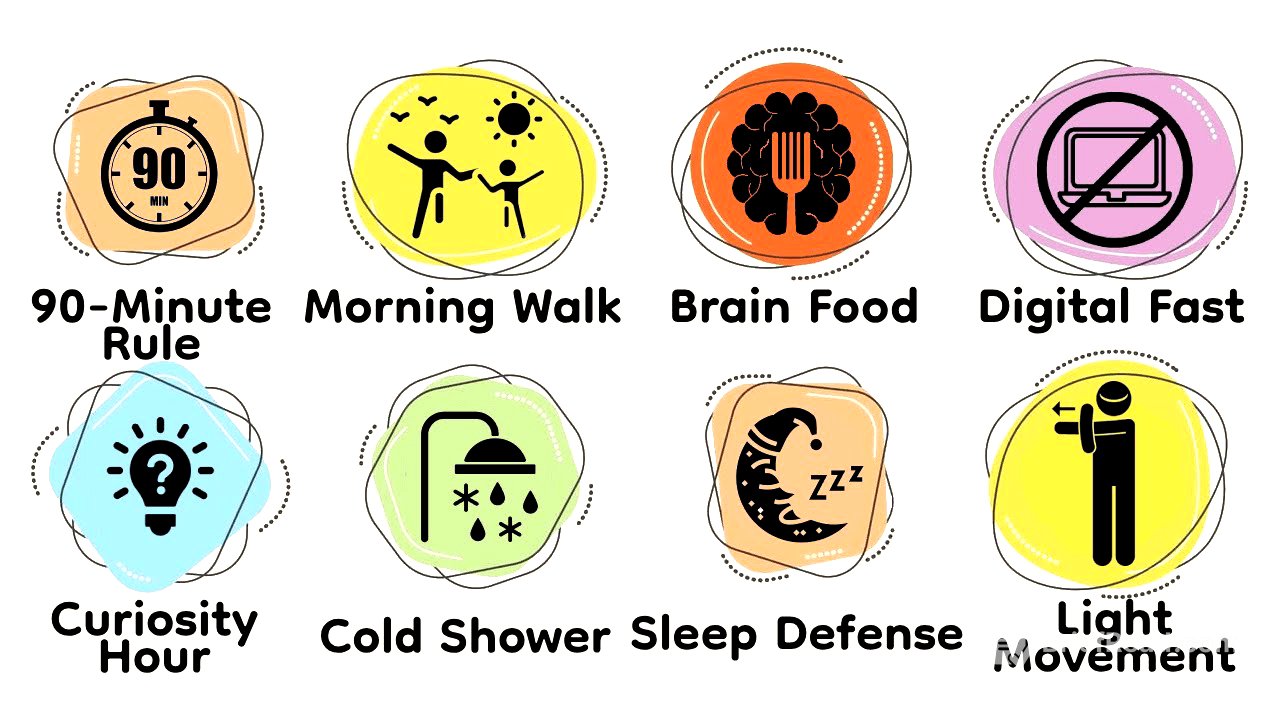TLDR;
This video outlines a series of daily habits designed to optimize brain function and overall well-being. It emphasizes the importance of structured work periods, physical activity, mindful eating, and strategic disconnection from technology. The routine includes practices to enhance cognitive functions such as memory, focus, and creativity, as well as habits that promote emotional regulation, stress reduction, and better sleep.
- Structured work and breaks
- Mindful eating habits
- Strategic disconnection from technology
- Enhance cognitive functions
- Promote emotional regulation and better sleep
The 90-Minute Rule [0:00]
The 90-minute rule leverages ultradian rhythms, which are natural 90-minute cycles during which the brain experiences peak alertness, creativity, and focus. By working in 90-minute intervals followed by a 15-minute break, individuals can achieve more in less time and maintain optimal brain function. This approach helps prevent mental fatigue and allows the brain to operate at its best.
The Morning Walk [0:53]
A 20-minute walk, especially in nature, activates the brain's default mode network, which is conducive to creative thinking. Walking increases blood flow to the brain, reduces stress hormones, and boosts the size of the hippocampus, the brain's memory center. This practice enhances cognitive function and overall brain health.
Brain Food [1:41]
Consuming foods that support neurotransmitter function is crucial for clear thinking and emotional well-being. Salmon, rich in omega-3s, blueberries loaded with antioxidants, and dark chocolate, which boosts blood flow to the brain, are excellent choices. Mindful eating without screens or distractions is also important for proper digestion and nutrient absorption.
Digital Fast [2:27]
Disconnecting from technology, including phones and social media, helps to reduce dopamine-driven cravings and improve focus. Constant notifications and digital stimulation can lead to decreased focus and a brain that is always seeking the next hit of dopamine. Tech-free periods allow the brain to settle into deep thought and enhance problem-solving abilities.
The Curiosity Hour [3:11]
Engaging in activities that spark curiosity, such as reading about interesting topics or exploring documentaries, activates the brain's reward system and enhances memory. Curiosity makes the brain more receptive to learning and helps maintain cognitive flexibility. This practice keeps the brain young and adaptable.
The Cold Shower [3:54]
Taking short cold showers activates norepinephrine, a neurotransmitter that increases alertness, attention, and mood. Cold exposure also builds resilience by training the brain to handle discomfort, which improves emotional control in daily life. This practice provides a natural boost to cognitive function and emotional stability.
The “Sleep Defense” [4:35]
Prioritizing 7-9 hours of sleep is essential for brain health. During sleep, the brain clears out toxins, consolidates memories, and builds new neural connections. Adequate sleep is crucial for maintaining and enhancing cognitive abilities.
Light Movement [5:15]
Engaging in light exercise, such as stretching, yoga, or a slow bike ride, boosts brain-derived neurotrophic factor (BDNF), which supports brain cell growth. Light movement promotes neuroplasticity, creativity, and mood without draining the body. This practice clears mental fog and prepares the mind for reflection and learning.
The “One Problem Journal” [6:07]
Writing about a single unsolved problem before bed primes the brain for sleep processing, where the brain continues to work on the problem during sleep. This can lead to insights and solutions. This habit wires the brain to seek solutions and builds strategic thinking and confidence.
Vision Reminder [6:55]
Reviewing a long-term goal each morning helps align daily efforts with a clear vision. This practice wires the brain to crave delayed gratification and makes the effort feel more rewarding. By connecting daily tasks to a future goal, individuals can enhance motivation and enjoy the process of working towards their objectives.
The “Mental Load Dump” [7:41]
Writing down all thoughts and tasks before bed clears the mental space and reduces anxiety. This practice helps to close open loops in the brain, leading to deeper sleep and a fresher mental state. By unloading mental clutter, individuals can improve focus and reduce stress.
Curiosity Burst [8:28]
Spending five minutes exploring a random question keeps the brain in a state of learning agility. This practice enhances cognitive flexibility, divergent thinking, and openness to novelty. Staying curious is essential for maintaining mental sharpness and adaptability.
Silent Mornings [9:09]
Starting the morning in complete silence allows the prefrontal cortex to boot up without distractions. Silence provides space for mental clarity and preparation. This practice enhances focus and sets a sharp, productive tone for the day.
The “Teach-Back Trick” [9:48]
Explaining something learned during the day as if teaching it to a child forces the brain to organize, simplify, and internalize the information. This technique enhances retention and turns information into intuition. Teaching reinforces learning and improves understanding.
Daily Win [10:20]
Reflecting on one thing done each day that moved you forward rewires the brain to focus on progress rather than perfection. This practice creates a mental state of momentum and associates effort with reward, enhancing motivation. Recognizing daily progress fuels ongoing growth and a positive mindset.
The “Iron Mindset” Workout [10:56]
Engaging in short, focused strength training sessions challenges willpower and builds mental discipline. This practice teaches the brain how to persist through resistance, increases testosterone, sharpens focus, and releases brain-repairing chemicals. Strength training enhances both physical and mental resilience.
Meditation [11:48]
Practicing daily meditation involves sitting in silence, focusing on breath, and observing thoughts without reacting. Meditation grows the prefrontal cortex and shrinks the amygdala, making individuals calmer, more focused, and less impulsive. This practice clears mental clutter and enhances overall brain function.
Gratitude Journaling [12:41]
Writing down three things to be grateful for each night rewires the brain to notice the good, reduces stress hormones, and improves sleep quality. This practice trains the brain to scan for wins rather than problems, changing internal language and fueling growth. Gratitude enhances positivity and overall well-being.
Napping [13:26]
Taking a 20-minute nap enhances memory consolidation, increases alertness, and boosts emotional regulation. Naps provide a quick recharge for the brain, leading to improved performance in the second half of the day. Resting strategically can enhance cognitive function and overall productivity.
Social Interaction [14:06]
Making space for one real human interaction each day releases oxytocin, reduces anxiety, strengthens memory, and improves verbal processing. Social connection keeps individuals grounded and prevents inner isolation. Meaningful interactions enhance emotional and cognitive well-being.
Sunlight Exposure [14:48]
Exposing oneself to natural sunlight in the morning boosts serotonin, anchors the circadian rhythm, and helps the body produce melatonin later that night. Sunlight acts as a natural alarm clock, mood booster, and brain charger. Morning sunlight exposure enhances mood, sleep, and overall brain function.









